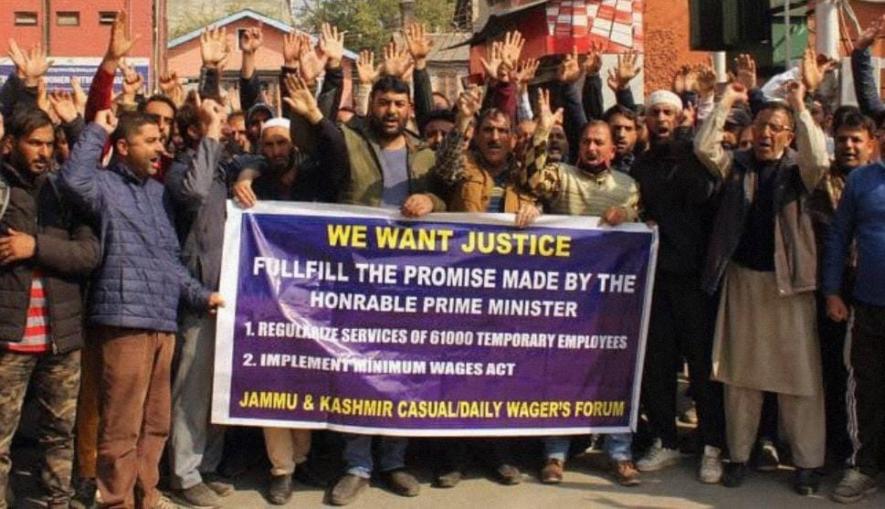J&K: Govt’s Reluctance to Implement Minimum Wages Act Leaves Thousands of Workers in Lurch

Image for representational purpose. Credit: The Kashmiriyat
Around 61,000 temporary workers in various government departments in Jammu and Kashmir are being forced into "dignified slavery" as a result of the government's reluctance to implement the Minimum Wages Act.
Ghulam Qadir Khan lives in a decrepit tin shack in Wargara Check village, about 16 kilometres from Beerwah in Kashmir's Budgam district. He has been working as a consolidated sweeper at the Sub-district Hospital Budgam for the past 16 years on a meagre monthly salary of Rs. 800.
His life took a tragic turn last year when his wife, who would help the family by doing housework and caring for her ailing in-laws, died after a brief illness. With his wife's death, he not only lost his sole support but also limited his ability to earn extra money as a labourer because he had to also care for his parents. "I used to work double shifts as a labourer to support my family, but my shoulders have become too burdened. I am now fed up with myself and will end my life if this continues," he says.
Nearly 61,000 temporary workers who perform their duties in various government departments across the Union Territory of Jammu and Kashmir are in the same situation as Qadir due to the government's unwillingness to implement the Minimum Wages Act in the Union Territory. These workers, classified as skilled, semi-skilled, unskilled, or highly skilled, are paid pittances ranging from Rs 500 to Rs 1200 per day.
According to Sajjad Parray, President of the Jammu and Kashmir Daily Wagers and Casual Labourers Association, these workers are suffering as a result of the government's ambiguity regarding the implementation of the Minimum Wages Act. He claimed that Prime Minister Narendra Modi stated in his first speech following the repeal of Article 370 on August 5 that the Minimum Wages Act would be implemented in the union territory. "Even Amit Shah, Union home minister, claimed during a speech in Jammu that the act had been implemented in the state, but the reality is quite different, "he told NewsClick.
He claimed that they have been protesting against this discrimination by holding hunger strikes and dharnas across the union territory since 2019, but that they have only received false assurances. "My question is if someone breaks a law, the government punishes him; who would punish the government for not enforcing the law here, despite the fact that all central laws became applicable in the union territory after August 5th?" he asked.
He added that as the government continues to delay the implementation of this act, the future of the workers’ families becomes increasingly bleak. "The employees are unable to support themselves and their families. Their children are being expelled from school, and some are unable to pay for their ailing parents' medical bills,” he said.
The majority of these workers joined the service between the ages of 12 and 15 years, and they have extended families to support. These workers' deaths leave their families unable to support themselves because they are not covered by social security.
Hilal Ahmad, a resident of North Kashmir's Kupwara district, was killed in a road accident on his way home from work in October of last year. He left behind his wife and two children with no means of support. "My uncle and brothers are looking after me and my children. They are paying my children's school fees,” Mehmooda, Hilal Ahmad's wife, told NewsClick.
She claimed Hilal had worked hard for the department for 15 years and was awaiting regularisation, but "no one from the department came forward to help or provide any job to any of the family members so that they could survive".
She continued that due to a lack of support, they have been left to fend for themselves and are living as beggars. "He gave his life to the department, risking his children's futures in the process, but received nothing in return. He is gone, but we are still here to bear the injustice of the government.”
While referring to their services as "dignified slavery," labour lawyer, Shabir Ahmad, told NewsClick that they are paid pitiful wages, which is a serious violation of their human rights. “This is a type of bonded labour that was long ago abolished. It is a more dignified form of slavery. Workers' rights are not respected, and their services are not protected," he said.
He believed that the issue should have been resolved when the UT was formed and that they should have been compensated in accordance with central laws. "This is an excellent time to act, and the government has the means to do so if it desires. Unfortunately, whoever has been in power has treated them as a voting bank,” he said, adding that the Minimum Wages Act, like the other central laws, should have been applicable after Article 370 was repealed.
Qadir's problems worsen as the government continues to postpone the implementation of the Act. His father-in-law suffered a stroke last month and had to borrow approximately Rs 25,000 for treatment, which he is yet to repay. "I still owe a debt I borrowed from a neighbour," he lamented.
Get the latest reports & analysis with people's perspective on Protests, movements & deep analytical videos, discussions of the current affairs in your Telegram app. Subscribe to NewsClick's Telegram channel & get Real-Time updates on stories, as they get published on our website.
























